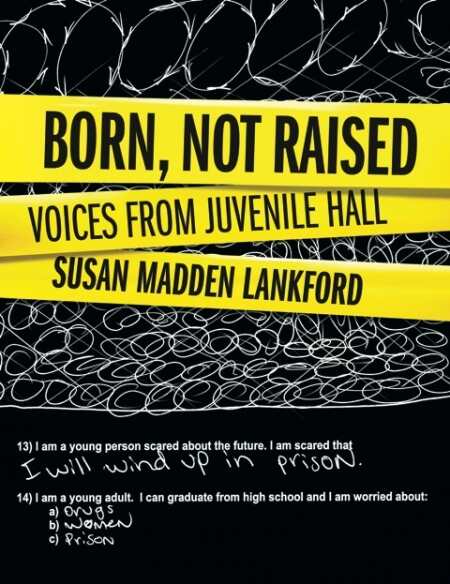Born, Not Raised
Voices from Juvenile Hall
- 2012 INDIES Winner
- Gold, Education (Adult Nonfiction)
“I am a 14 to 17 year old scared that I will end up in prison.”
For over two million children arrested in the US every year, this is an intelligent fear because most of them will. In Born, Not Raised, a book of affecting photos, handwritten stories, interviews, and transcribed conversations with and about juveniles in detention, Susan Madden Lankford unflinchingly looks at why and how these children came to be where they are. Although the stories and subject matter are often depressing, the overall book draws the reader in immediately and fascinates from beginning to end.
Oversized, with a mostly black cover crossed with bright yellow bands reminiscent of the tape the police put around a crime scene, much of this book is handwritten by the youth themselves. In response to questions and photos presented by the author and her daughter, Polly Lankford Smith, a student of psychology, it also contains graffiti and stick-figure diagrams, as well as beautiful drawings by the kids. The author has scanned their responses to questionnaires and, while it can be frustrating to puzzle out some of the barely comprehensive handwriting, that is part of the effectiveness of this book. One boy, aged fifteen, advises: “start hitting your kids at a young age” in handwriting a preschooler would be ashamed of. While on the opposite page, a fourteen-year-old has sketched four beautiful trees and a rushing stream in response to the request that he “Draw for us a space you like to go for ‘your time’—a time of peacefulness.” The reader realizes there is almost no chance that this child has actually been to a place like the one he has drawn.
Besides the material from the kids themselves that comprises about half the pages, there are transcribed conversations that Lankford and her daughter had with a doctor of adolescent psychiatry, Diane Campbell, and insights from Dr. Bruce Perry, a well-known lecturer and Senior Fellow of the Child Trauma Academy. In this way, the author presents easily understandable versions of complex research in neurobiology, psychology, and trauma responses and the reader begins to understand what has happened to land these children in the system, what is likely to happen to them when they get out, and possible solutions for modern society to consider.
Lankford makes the case that understanding this particular population is an important first step in improving all our lives. This is a wonderful vehicle both for young adults and adults to begin that understanding.
Reviewed by
Jane Haugh
Disclosure: This article is not an endorsement, but a review. The publisher of this book provided free copies of the book and paid a small fee to have their book reviewed by a professional reviewer. Foreword Reviews and Clarion Reviews make no guarantee that the publisher will receive a positive review. Foreword Magazine, Inc. is disclosing this in accordance with the Federal Trade Commission’s 16 CFR, Part 255.

